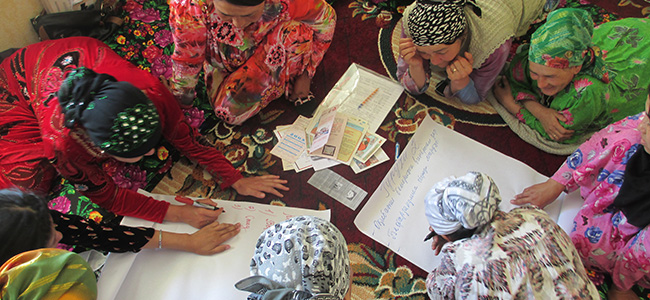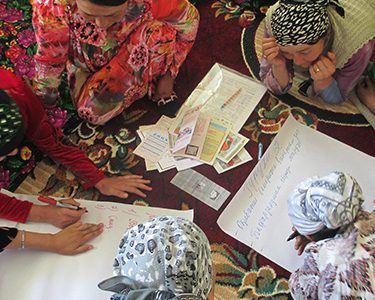Community development 2013
Community development 2013


The project involves institutional support for 10 Mahalla communities through organizing workshops and trainings, and helping with financing local initiatives. Approx. 150 people will have the opportunity to take part in the trainings and workshops.
Status: ongoing
Duration: February 15 – November 15, 2013
Community development through institutional support for Mahalla committees in Tajikistan
Objectives
To strengthen the capacity of local communities in the management and resolution of problems at the local level through technical support and institutional development provided to Mahalla committees:
- Support the development of local democracy through the transfer of know-how to 10 Mahalla communities to improve their ability to work effectively with local organizations and administration entities;
- Enhance the skills of 150 local leaders to effectively govern local communities and to create social dialogue mechanisms;
- Strengthen the capacity of 7 local communities by providing resources to support the implementation of local development projects.
Background and description of needs
The institution of Mahalla – a self-governing entity functioning at the neighborhood level – is deeply rooted in Central Asian traditions. It has played a key role in regulating social life for centuries. Traditional Mahalla communities in rural areas are subject to the jurisdiction of jamoats (communes), while in the cities they are respectively subordinated to urban authorities.
Typically, in one jamoat there are several, to over a dozen, Mahalla communities. In 2008, a new Law regarding Social Initiative Entities was enacted (Order Respublika Tadzhikistan ob Organah Obschestvennoj Samodejatel’nosti, № 347, 2008) in which civil society organizations, such as Mahalla, can be formally registered.
Under the Law, Mahalla is the smallest unit of the state regulating the lives of its inhabitants at the local level. Mahallas can officially work with national government entities and international organizations, and raise funds from other sources.
Despite their statutory guaranteed privileges and opportunities for cooperation with non-governmental organizations and local authorities, Mahallas have quite limited operational capabilities. Jamoats practically withdrew from investing at the local level, thus the only chance for development are funds collected by Mahallas from community residents or through collaboration with NGOs.
Potential cooperation, however, brings a number of challenges and is associated with obtaining specific skills to understand the mechanisms of working with donors. The proposed project aims to fill that gap by initiating activities, along with Mahalla communities, to support local development.
Beneficiaries
The project involves institutional support for 10 Mahalla communities through organizing workshops and trainings, and helping with financing local initiatives. Approx. 150 people will have the opportunity to take part in the trainings and workshops. 10 Mahalla communities will participate in a contest for the best local initiative. The 7 best mini-projects will receive financial support. In addition, the most active communities will be provided with solar panels and sets of furniture for their Mahalla committees’ offices.
Project location
Tajikistan, Khatlon Province, 3 jamoats (communes) in the area of Kurganteppa
The grant, amounting to PLN 345,900, received under the Polish Aid program of the Polish Ministry of Foreign Affairs in 2013.

